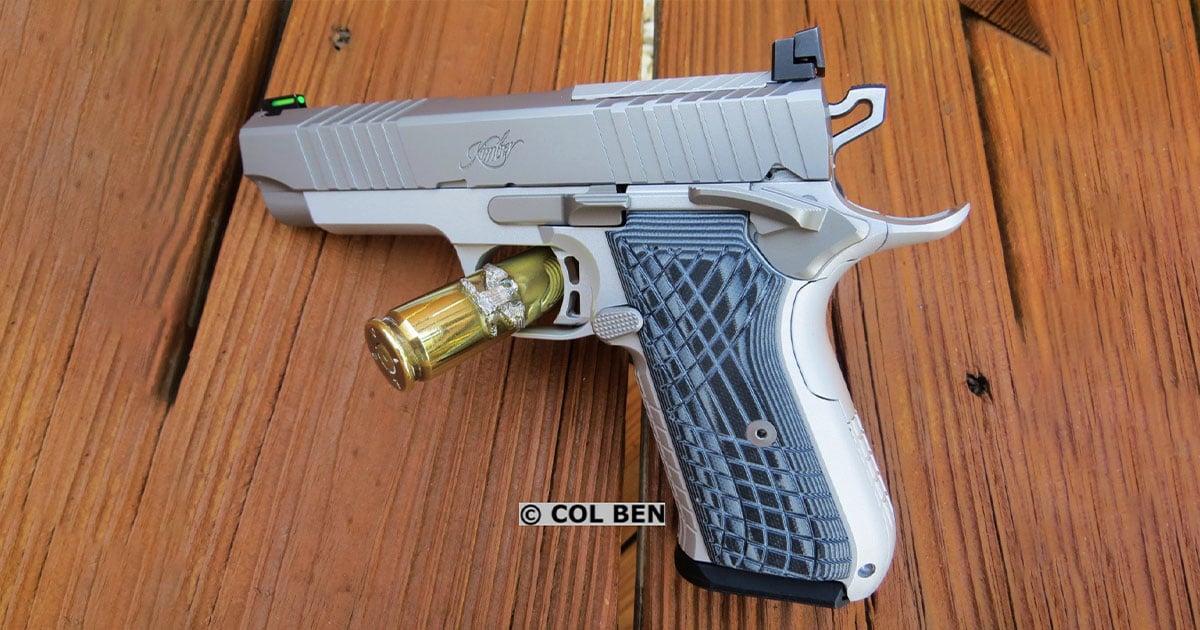A couple of months ago, I reviewed the KDS9c with Rail. The KDS9c model I am reviewing today has no rail, and I will compare the two models. “KDS9c” stands for “Kimber Double-Stack 9mm Compact” pistol. The NRA selected this model as their Gun of the Week on May 3, 2024. Having no Picatinny Rail means you cannot attach a laser or light. Whether you prefer a rail on your concealed carry pistol or not, it is important to find and use the tool that fits your needs and, most importantly, train with it! Having a rail on a concealed carry pistol is controversial, so see the following section about some comments I received when I posed the question to a sample of experienced shooters. If you use a concealed carry pistol with a rail light mounted to it, you need to know what you are doing, be trained, and follow safety rules.
The KDS9c is an M-1911 style pistol built around a double-stack 9mm magazine, sized down for the 9mm cartridge, and designed for concealed carry. So that is the general definition of a 2011 carry-size pistol: a single-action, carry-size 9mm gun with a double-stack magazine. The 2011 double-stack 1911 retains the positive attributes of the 1911 (same grip angle, the single-action trigger, ergonomics, beavertail, manual safety for carrying cocked-and-locked, skeletonized hammer, etc.) while enhancing capacity for more rounds. Recognize that the KDS9c’s trigger, hammer, sear, and disconnector are classic 1911 in design. So there is the 1911 single-stack feel, function, and control, but with increased magazine capacity.
The Kimber KDS9c No-Rail Review Plan
Here are the 12 major sections of my Kimber KDS9c No-Rail review:
Some Thoughts About A Rail On A Concealed Carry Pistol – Comments From Experienced Shooters:
“Pointing a gun at someone is a felony crime in Florida, punishable by imprisonment and fines. If you are undocumented or on a visitor visa and authorities convict you, they can also deport you. And it makes no difference whether the gun you pointed was loaded.”
“If I hear a bump in the night and go to investigate, I’d hate to be aiming my flashlight (which has a loaded gun attached to it) at one of my kids or my wife.”
“Having a light on a CCW handgun for illumination is a near-perfect setup for making a horrible mistake. Pointing a handgun at someone I don’t intend to destroy violates a cardinal rule of safely using a firearm.”
“I had a situation in which I heard a noise outside my house, grabbed my .45 with rail, and went outside to find out what was happening. It ended up being a neighbor arranging her trash cans. That was my first time drawing down on someone at night (an innocent neighbor) with a Weapon Mounted Light. The only reason she didn’t complain to police was that the light blinded her ability to see it was mounted to a weapon.”
“You give away your position to the bad guy. You’re just gonna give someone an opportunity to shoot you when you are busy trying to blind them or locate them.”
“A big con to me is the “flashlight” effect. You can end up using your gun as a flashlight and point your muzzle at people you do not intend to kill because you want to illuminate them. You MUST carry a separate handheld flashlight. Training and discipline are the answers.”
“If I’m pointing my weapon light at someone, I’m pointing the gun at someone. Without justification, that can constitute assault or even a felony, depending on the situation.”
“In the U.S., brandishing a firearm is generally a misdemeanor crime, punishable by up to a year in the county jail and/or a fine up to $2,000. Felony assault with a deadly weapon can result in state prison time.”
“I suggest forgoing the weapon-mounted light on a pistol and sticking with hand-held flashlights unless you’re dedicated to training with a Weapon Mounted Light on a pistol.”
Goal Of This Review
With the introduction of this KDS9c, my goal is to thoroughly analyze, compare, shoot it, and rate it for recommendation or not for concealed carry in this review.
Several readers and students have asked what criteria I use to analyze my recommended handguns, so I want to give my criteria and range test results for this pistol to help you analyze your handguns and make the best selection for yourself, especially for your concealed carry purpose. You can add or subtract from my criteria to meet your needs and preferences. I was very anxious to shoot the KDS9c and to compare it factor by factor to my other quality compact 9mms to see how it truly ranked. It is similar to the size of a Glock 19 and competes with handguns like the Staccato C2 and the Wilson EDC X9, priced around $2,300 or so.
I requested the KDS9c from Kimber, and they were nice enough to loan me one for testing and evaluation purposes. Know that I am not on the Kimber payroll, have not been paid by them for this article, and have not been influenced to say certain things about the gun. I want to be honest and straightforward with my opinions and ideas about the pistol to help concealed carry folks sincerely.
Specifically for this review, I wanted to compare it to the Rail Model I reviewed a few months ago. I wanted to know how accurate it is out of the box, without modifications. Is it reliable? What about the trigger press weight? Is the trigger smooth and crisp? What about the reset distance for follow-up shots? Do the rounded edges and bobtail butt really help with concealability? Are the fiber optic sights helpful? Can I easily handle the recoil? What about its ergonomics, comfort, and feel in the hand? What are its pros and cons? Are there any issues or concerns that would prevent me from carrying this gun? Is this a gun I would recommend for concealed carry? I will give you my criteria, ratings, opinions, and recommendations in this review.
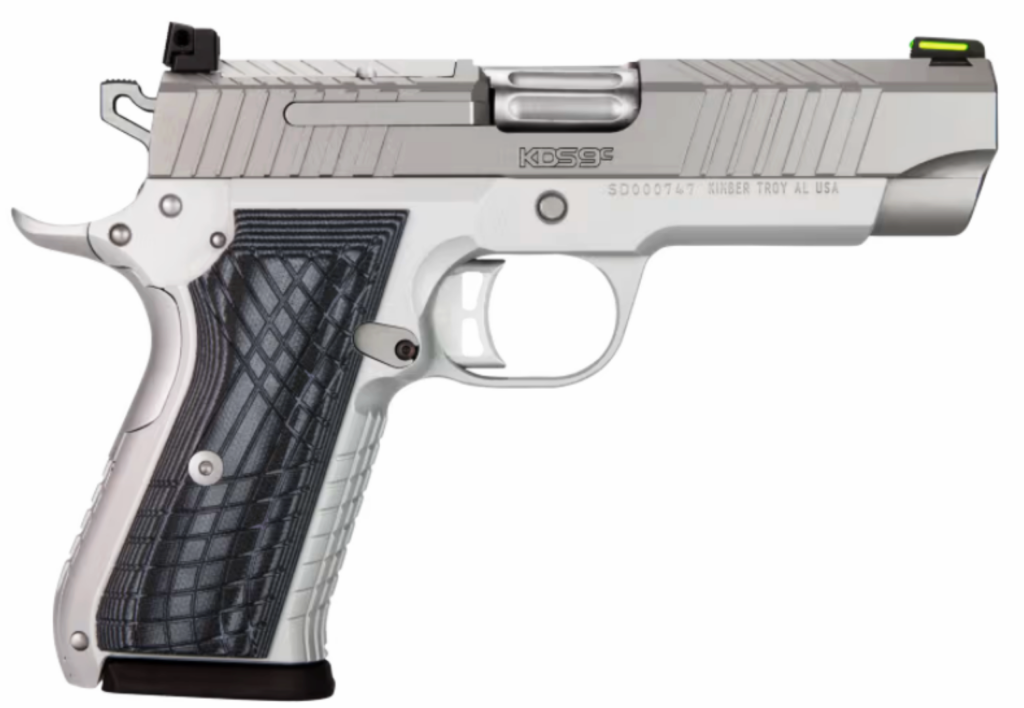
First-Glance Features – KDS9C 9MM
Four features stood out to me before I even shot this pistol:
Trigger: Match-Grade, Single-Action, Flat, & Skeletonized Aluminum
The trigger is single-action and flat to allow a more speedy and consistent press and flexibility regarding where you place your finger. A curved trigger introduces the possibility of inconsistent trigger press weight due to varying leverage created by the curve. With a flat trigger, I can press anywhere on the flat surface, get a clean, smooth press, and fire the shots quickly while managing recoil. A flat trigger provides me a more consistent feel through the press and feels the same every time, even if my grip is off some. I expect this pistol to have fine Kimber-proven features representing basic performance, accuracy, excellent reliability, value for features, and fine ergonomics.
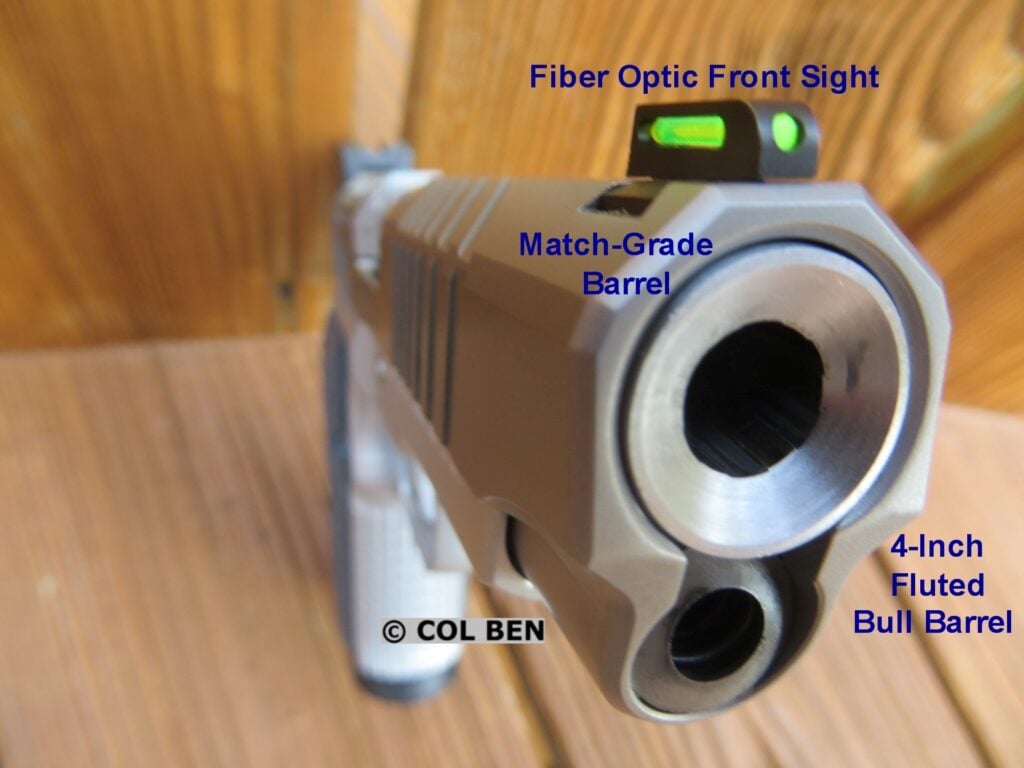

Barrel: Match-Grade, Stainless Steel, Fully-Fluted, Ramped Bull
For me, Match Grade means fine quality handgun parts, especially the trigger and barrel, suitable for competition matches and high performance. It usually means features and parts that are manufactured with high precision, tighter tolerances, and more exacting dimensions. This pistol is offered with a Match-Grade stainless steel bull barrel, which is fully fluted. Fluting looks good to me and reduces weight, cools down the barrel quicker, and gives faster heat dissipation after firing. Generally, a bull barrel does not taper outward, is cylindrical and larger in circumference, and is stiffer to reduce vibrations. It is usually a thicker and heavier barrel to better manage recoil.
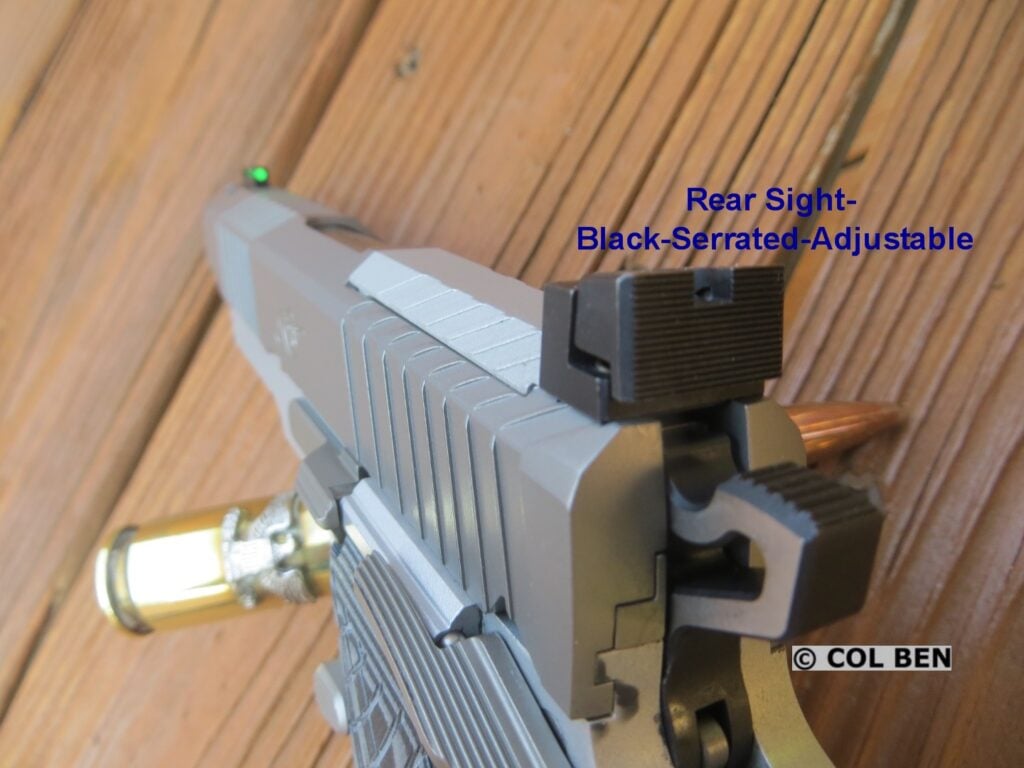

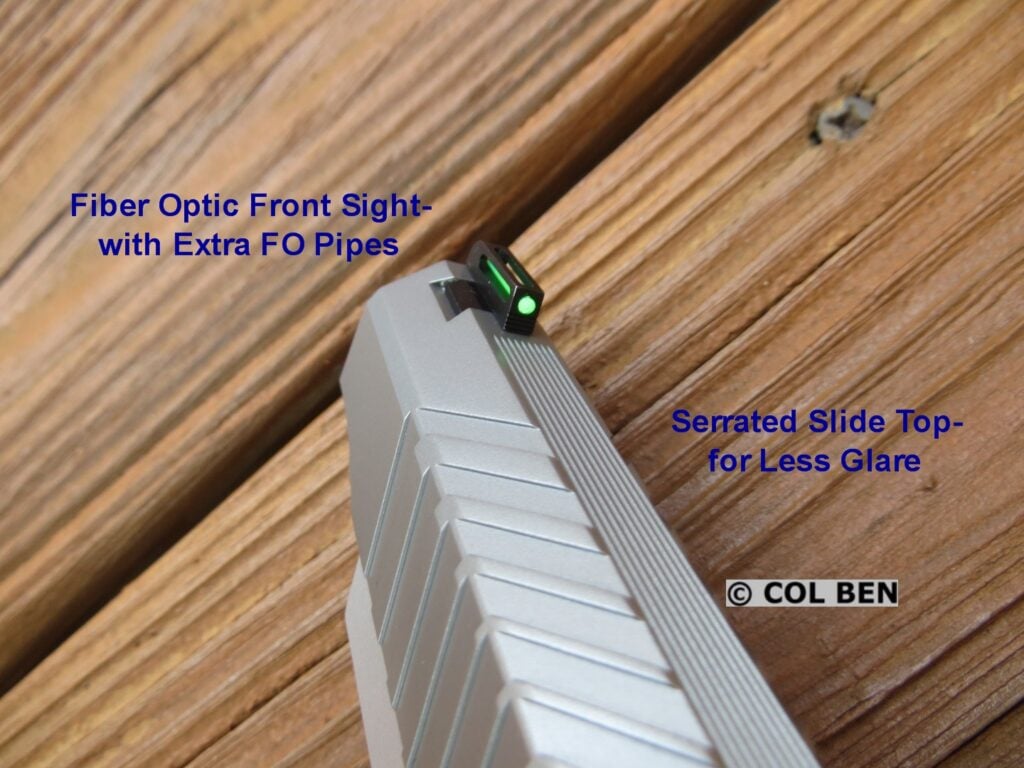

Front & Rear Sights: Excellent Green Fiber Optic Front & Black Serrated Rear, Adjustable Sights
The sights were easy to pick up and use on this fine KDS9c 9mm compact pistol. Since I am color blind, the green fiber optic sights worked great for me. I could quickly see and use them day and night. My non-color-blind wife also liked them and easily used the sights. The glow of that fiber optic front sight really helps me quickly get on target.
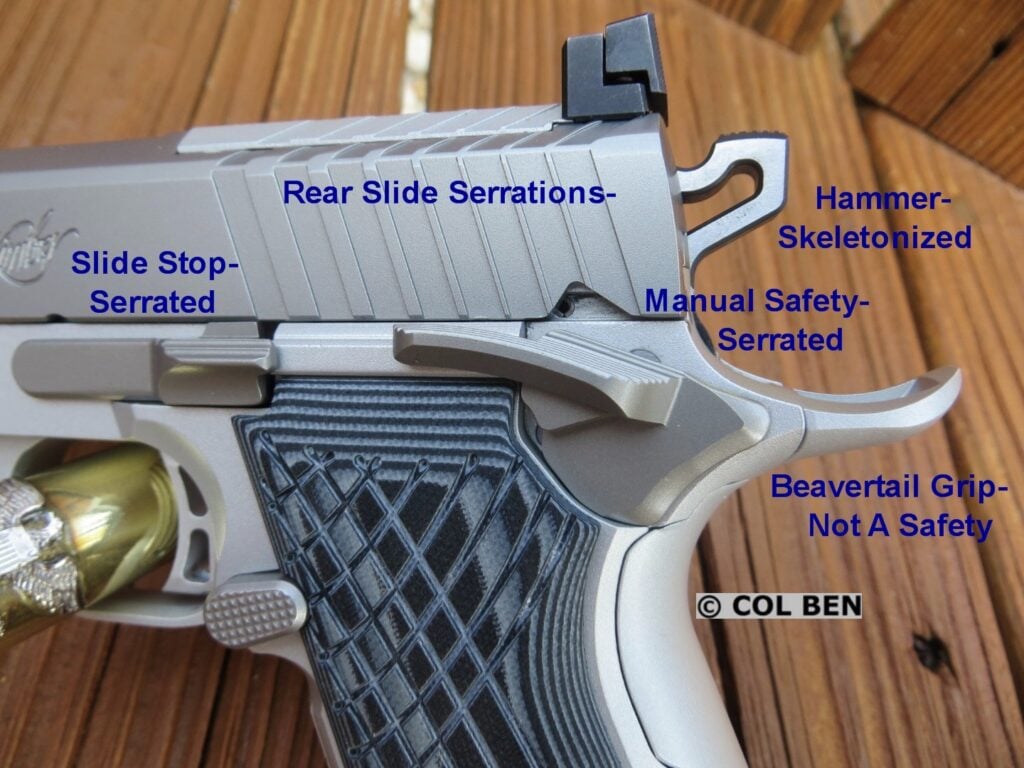

Frame: Lightweight Aerospace-Grade 7075 Aluminum with Beavertail Grip, Skeletonized Hammer, Serrated Rear Slide, Slide Stop, and Manual Safety
This pistol has a lightweight aluminum frame that makes carrying it easier. And its beavertail grip (shown above), slightly-beveled magwell to help fast reloading, and rounded and smooth Bobtail Butt also help concealed carry. This solidly built, decent-valued-for-what-you-get pistol has features normally found on much more expensive pistols and feels high quality.
Kimber KDS9C 9MM Compact Specifications
Kimber KDS9C 9MM Compact Features
- Ambidextrous Thumb Safeties
- Full-Length Steel Guide Rod and 16.9-Pound Flat-Wire Recoil Spring
- Tactical Skeletonized Trigger to Reduce weight & with Over-travel Screw
- Tactical Skeletonized and Serrated Hammer to Help Cocking
- External Steel Extractor Pinned to Outer Slide with Separate Spring Tension
- Loaded Chamber Indicator Notch at Rear of Barrel for Chamber Loaded Status
- Bull Barrel with 30-Degree Target Crown to Protect Bore & to Help Accuracy
- Back Strap/Mainspring Housing and Front Strap Checkering
- Bushingless Barrel with Flat Wire Spring, Guide Rod, and Plunger
- Front and Rear Serrations that Wrap Around Top of Slide to Enhance Grip
- Attractive and Durable KimPro Silver Finish on Slide and Frame
- All Edges and Sights Smoothed and Rounded for Carry; Bobtail Butt for Carry
- Slightly-Flared Magwell to Enhance Mag Changes
- Ejection Port is Lowered and Flared to Help With Cartridge Ejection
- Reversible and Checkered Magazine Release and Manual Thumb Safety
- Optic Ready Slide is Cut for Optic Adapter Plate (Optional- RMSC & Holosun-K)
- Standard GI-Style Serrated Slide Stop
- Tight Slide-to-Frame fit with no Discernable Play
Col. Ben’s 10 Evaluation Criteria
I use ten criteria and factors for evaluating any handgun, so I will use them for the Kimber KDS9C compact. In addition to my criteria, other subjective features may be appealing for some, like a particular style, mag release location, action, caliber, appearance, number of mags included, type of sights/modifications, bore axis, rail, grip angle, non-porting or porting, included extras like a holster and pouch, customer service, etc. So, I combined these into my last Miscellaneous criterion. I must admit that ALL gun-choice decisions involve tradeoffs, but I really want ALL of my criteria to be met. I assigned a total possible point score of 10 points for each of my ten criteria for a total possible score of 100 points. You can add your own criteria and preferences or subtract any of mine.
Recognize that there are several features, characteristics, pros and cons, and personal criteria to include and consider, and you can make tradeoffs according to your priorities, preferences, defined needs, and use.
Ammo Used In Testing
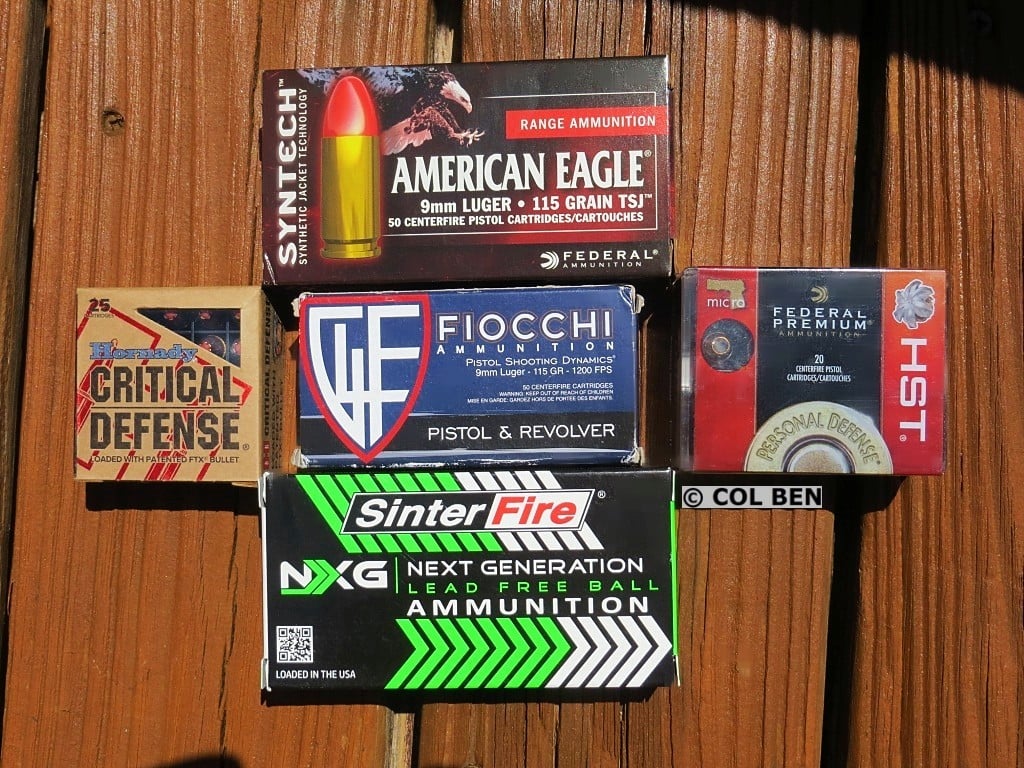

For range testing the KDS9c pistol, I used various high-quality 9mm ammo with 115, 124, 100, and 150 grains, jacketed hollow point ammo, and full metal jacket ball ammo.
Here are the various high-quality 9mm rounds with different grain weights and types:
- Hornady Critical Defense 115 gr FTX
- Federal Premium HST 150 gr JHP
- American Eagle 115 gr Total Synthetic Jacket- Polymer
- Fiocchi 115 gr and 124 gr FMJ, and
- SinterFire NXG, Lead-Free 100 gr Ball
This variety of ammo gave me the information I needed to test and evaluate this pistol. I fired about 300 rounds to evaluate this gun (usually, I shoot 500 rounds over a couple of days) to decide if I wanted to carry the gun or not. I used the ammo I already had on hand. Below, you can see my evaluations for each of my ten criteria and myrecommendation (or not) for this pistol and my concealed carry purpose. I put this gun through its paces and checked it thoroughly for malfunctions and performance with this variety of quality ammo.
Ben’s Concealed Carry Drill
I used my standard Concealed Carry Drill to test and evaluate the KDS9c Rail after thoroughly cleaning it. You can also use my Concealed Carry Drill to test and evaluate your handguns. I like the realistic 5-yard, 7-yard, and 10-yard distances best to match common distances for personal defense purposes.
Download, Print, and Share My Concealed Carry Drill and Target
You can have my Concealed Carry Drill for Free for your practice. Permission to Download, Print, and share “Col. Ben’s Concealed Carry Drill” is granted when my website address and copyright are included and kept on it.
You can Download and Print “Col. Ben’s Concealed Carry Drill” and targets by clicking on the link at my website’s Articles Page at www.FloridaHandgunsTraining.com.
Range Routine with “Col. Ben’s Concealed Carry Drill”
As usual, I started with my Concealed Carry Drill target at the 3-yard distance to warm up and get used to the trigger, operational mechanics, and recoil. No problems at all here. All my hits were inside the bullseye area of each of the five circles. It is very accurate and reliable initially up close. The grip was very comfortable and textured just right for me. I really like the light, smooth, and soft trigger press. The performance was there, and there were no malfunctions or concerns. It is very similar to the KDS9c Rail model I reviewed earlier.
I continued using my above standard Concealed Carry Drill at 5, 7, 10, 15, and 20 yards and performed two iterations at each distance. I easily and quickly landed all 15 rounds on the 5-circle targets from a draw on targets at 3, 5, 7, and 10 yards. At 15 yards and 20 yards, my ole codger eyes failed me some, but I still managed to qualify with 80% hits and times at 15 yards. At 20 yards for both trials, I only got 2 of 3 shots on the small 2.5″ target. My fundamentals and marksmanship skills were right on. And the pistol did its job! But, the problem with hitting the smaller target was my aging eyes. I did not make the time limit of 20 seconds overall at 20 yards for the first trial, but did at the second trial. So, I must practice more and get a new set of eyes for my aging ones. Hope my Drill helps you.
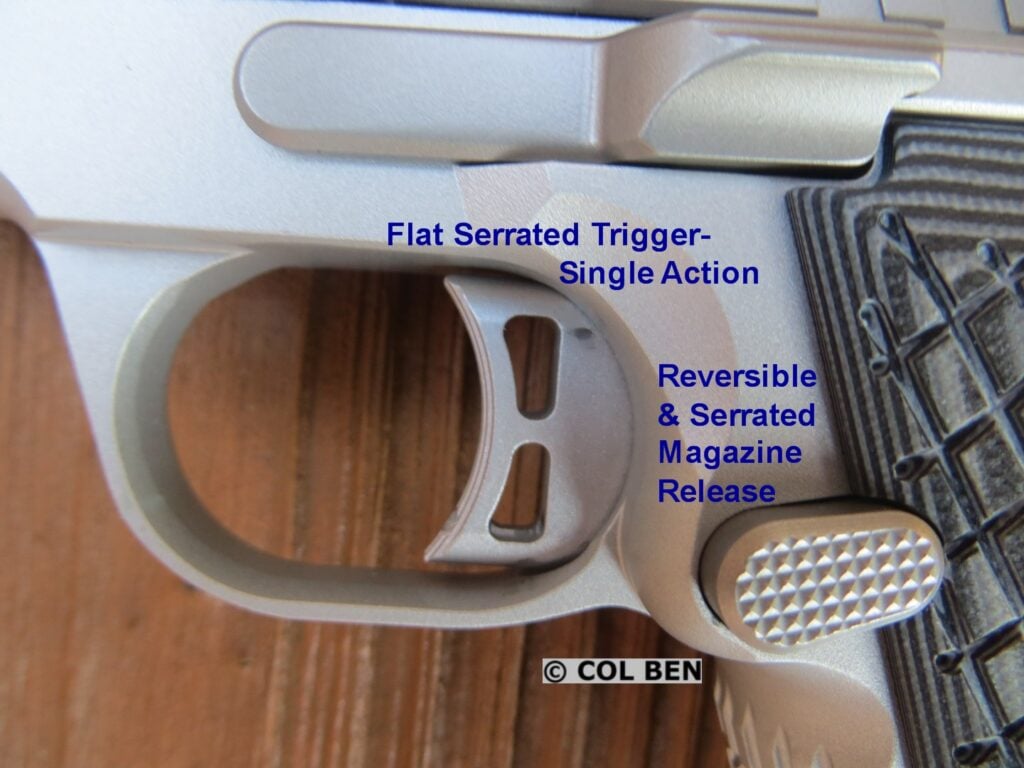

Overall Range Test Results
Altogether, this pistol looks and performs great. This Kimber KDS9c has a high-quality appearance, and the fit and finish are exceptional, especially for its price and the features you get. This fine pistol has excellent overall ergonomics. When I field-tested it at the range, it was comfortable in my hand and felt good. The G10 grips with the cross-hatch pattern look exceptional and are made of very durable material. They are slightly thicker for the added capacity but still thin for a comfortable and stable grip.
Note: I wanted the grip checkering to be slightly more aggressive for a more solid grasp since I sweat profusely. The type of checkering on the front strap and mainspring housing/back of the grips was my only real concern, albeit minor, for this fine gun since it affects my firm grip. It also did not have the quality look of the checkering on some of my other Kimbers. My Kimber 1911 Pro Carry II has 25 LPI back strap checkering, while my 1911 Aegis Elite Pro and Ultra pistols have 24 LPI checkering on the front straps. These are excellent all-around grip checkering and texturing for a very classy, high-quality look and actual performance. But, of course, it costs more. I usually prefer from 20 to 30 LPI checkering on the front and rear backstrap of the grips. Not only does it give the pistol an outstanding look, but it also helps with a solid grip. So maybe just some 20 LPI checkering would help the grasp. Again, this adds to the cost of the above-standard grip checkering. Usually, you get what you pay for.
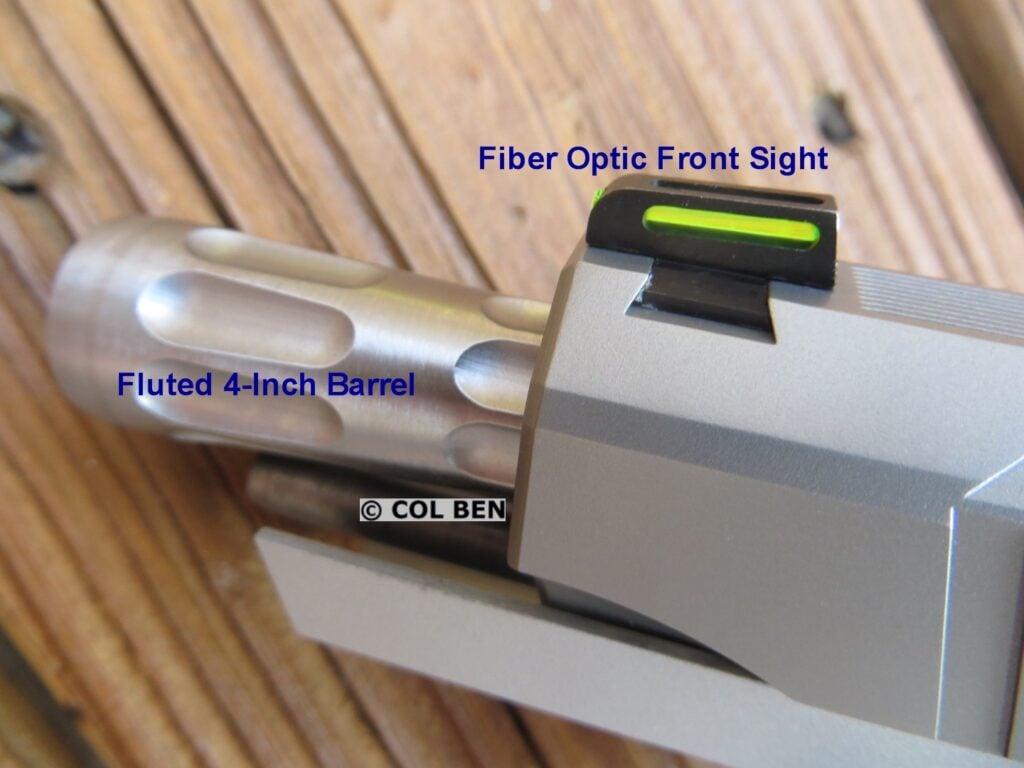

The fluted 4-inch barrel, fine single-action trigger, and fiber optic front sight with the green color really helped me be accurate. And I could easily reach all the controls on this fine pistol. The mag release is reversible, textured, and easy to access. It has a left-side and a right-side thumb safety but no grip safety. There is a Beavertail Grip. The slide stop is extended and works well. The two double-stack metal mags were nice and hold 15 rounds and 18 rounds. The slide was very easy for me to rack with its fine serrations, and the felt recoil and muzzle rise was surprisingly very manageable for this compact pistol. I do wish the undercut behind the trigger guard and below the mag release was just a little more undercut to further help my high-hand grip on the pistol.
Overall, after my range live fire, the Kimber KDS9c single-action compact gun impressed me as a very attractive, accurate, and reliable carry gun (with a limited 300 rounds fired by me). With the various types, weights, and quality of ammo fired, I had no malfunctions or stoppages at all. Fantastic reliability, just like the Rail model!
At the range, shooting the gun for the first time up close, my first 15 rounds fired rapid fire at 5 yards, all hit in a nice 2.5″ or so group, considering my declining eyesight. My next 15 rounds fired at 7 yards formed a similar group but about a 2.5″ to 3.0″ group. For this aging shooter with challenging vision, the hits were acceptable for closeup self-defense encounters. Accuracy was very acceptable over different up-close, tactical distances, but shoot it for yourself to make your own decisions based on your abilities and proficiency. Below are my hits on my Carry Drill target for 15 rounds fired at 7 yards with the KDS9c model.
Next, after my range testing, I will present my ideas, ratings, and some details for each of my criteria.
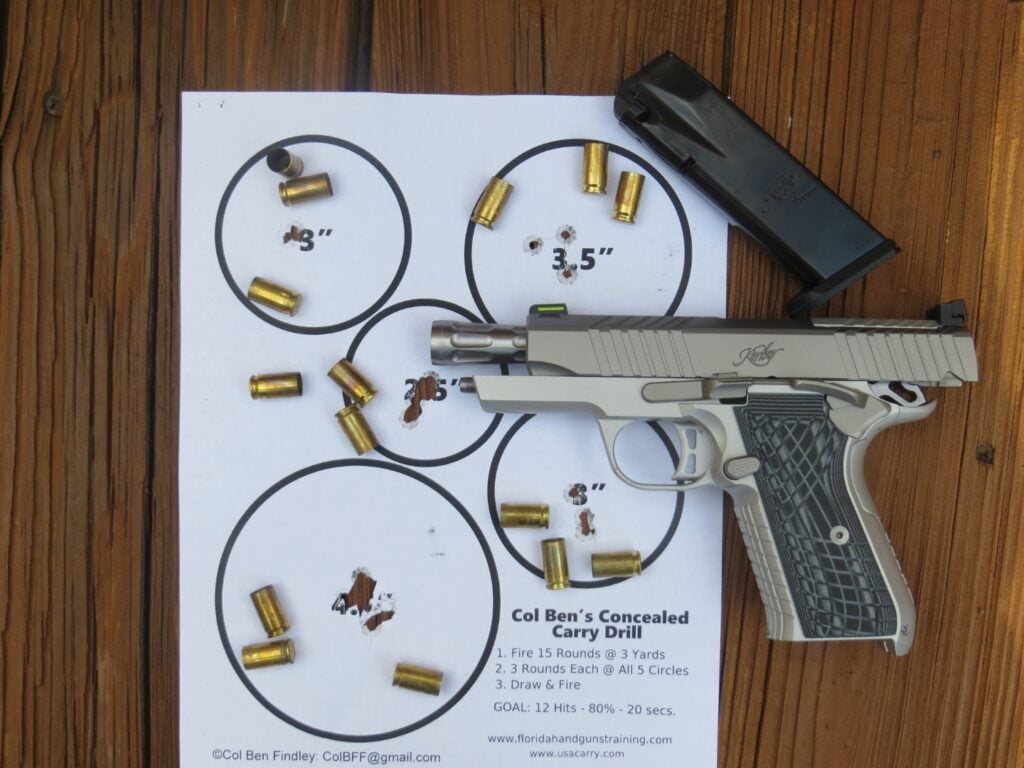

Range Test Results For Each Of My 10 Criteria:
Accuracy and Reliability – Score: 10
The accuracy of the compact KDS9c was excellent for me at self-defense distances of 3, 5, 7, and 10 yards, even with my aging eyesight. My groups at each up-close encounter distance were about 2.0-2.5 inches or better for the first time I ever fired the gun after cleaning it. Groups were similar for me at all distances, using the various types and grains of cartridges. I fired about 300 rounds. The 4.0 # trigger press I experienced was crisp, soft, smooth, and outstanding for accuracy. The comfortble and solid G10 grips and the flat single-action match-grade trigger really helped account for this result. I used my Modified-Isosceles Stance, a two-handed grip, and shot various high-performance quality 115, 124, 100, and 150-grain JHPs and FMJs.
Trigger Press – Score: 10
The trigger press averaged about 4.0 pounds with ten readings from my Electronic Trigger Pull Gauge. I like my carry guns to have around a 4-pound press, so this meets my expectations. Of course, this is a personal preference. I liked that the trigger press was crisp and easily identifiable. There was a small amount of pretravel/takeup, a solid tactile wall stop, and then a smooth and crisp break with no overtravel. The reset was fast. The polished feed ramp helped. Single-action shooters will really appreciate this press.
Trigger – Score: 10
The trigger was match-grade, solid aluminum, and had a tactile and very identifiable click and reset. I liked the relatively short and positive reset and very crisp trigger. The trigger is adjustable for the length of travel. Since the trigger pulls straight to the rear rather than pivoting, there is minimal movement to make the shot. My shots were consistent each time, and I could easily recognize the reset point. I did like shooting it because of this excellent trigger. It has a fine, soft, and smooth trigger for a compact pistol.


Barrel Length – Score: 10
The 4.09-inch barrel was match-grade, stainless steel, cone-shaped, and had a 16-pound recoil spring, a bushingless, fully flushed, and ramped Bull barrel, and a polished 30-degree flush-and-deep cut Target Crown. These most definitely helped control muzzle flip and felt recoil—very nice recoil control. The steel barrel was high quality, and its compact size made it very concealable. It does not use a bushing, and the barrel is locked into the frame by a slide stop pin and barrel link. It has a highly polished feed ramp.
Sights – Score: 10
The front and rear sights are excellent, with the green front sight really standing out for me. They are highly visible and great for me and my color blindness. The rear sight is dovetailed and part of the mounting plate. The green glowing fiber optic sight glows nicely and helps me get a better and quicker lock on the front sight and target.
Proper Gun Weight – Score: 9
The 25.28 ounce unloaded weight with the 15-round mag is certainly very acceptable, with the aluminum 7075 lightweight frame, for concealed carry and is just at my desired range. The pistol is machined from billet and offers rigidity and durability. This non-railed model is lighter, of course, at 25.28 ounces (versus the 29.6 ounces for the rail model), but with the lightweight comes some disadvantages, like just a little more felt recoil and snappiness. This weight overall is certainly acceptable for carry.
Caliber – Score: 10
It was easy and comfortable to shoot the 9mm caliber. The KDS9c has an almost perfect balance between portability and performance. The felt recoil of the 9mm was easy for me to control. It easily digested the various weights of 9mm ammo without a single malfunction or stoppage. The lightweight aluminum frame made it comfortable to carry and recoil, although there was no major problem.
Capacity – Score: 9
Two fine-quality epoxy-coated steel magazines with polymer followers are included as standard, two 15-round magazines. I went to the Kimber Store to check, and the price for a 15-round mag was $50 each, and an 18-round mag was $65. I want at least three mags to be included as standard.
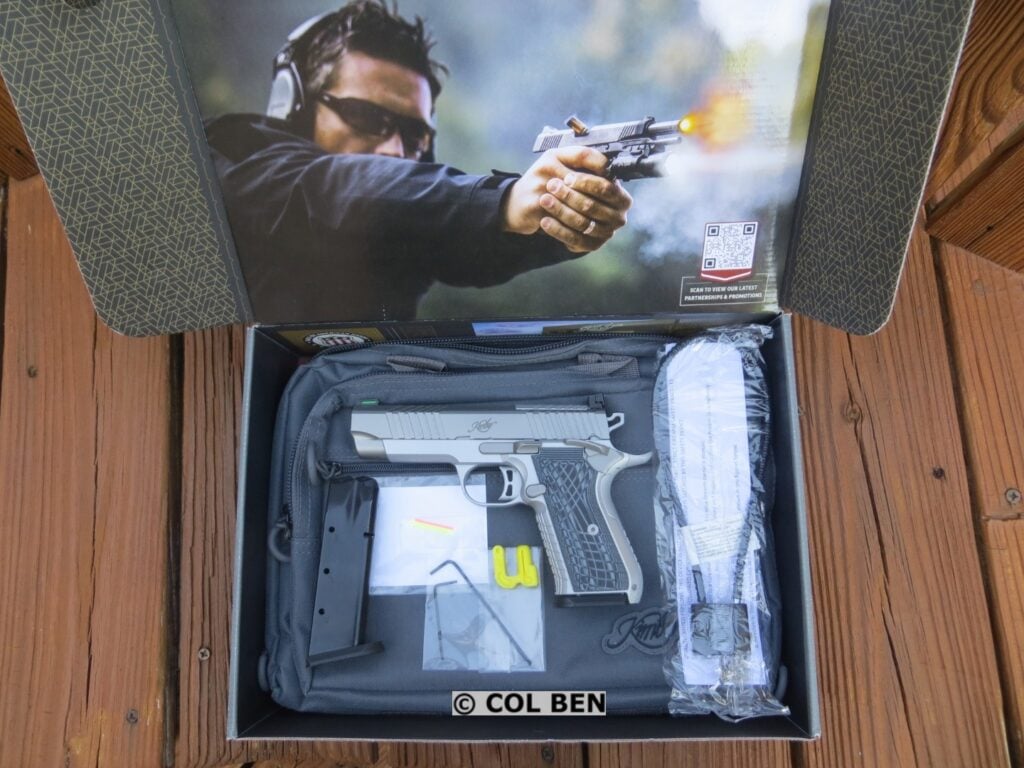

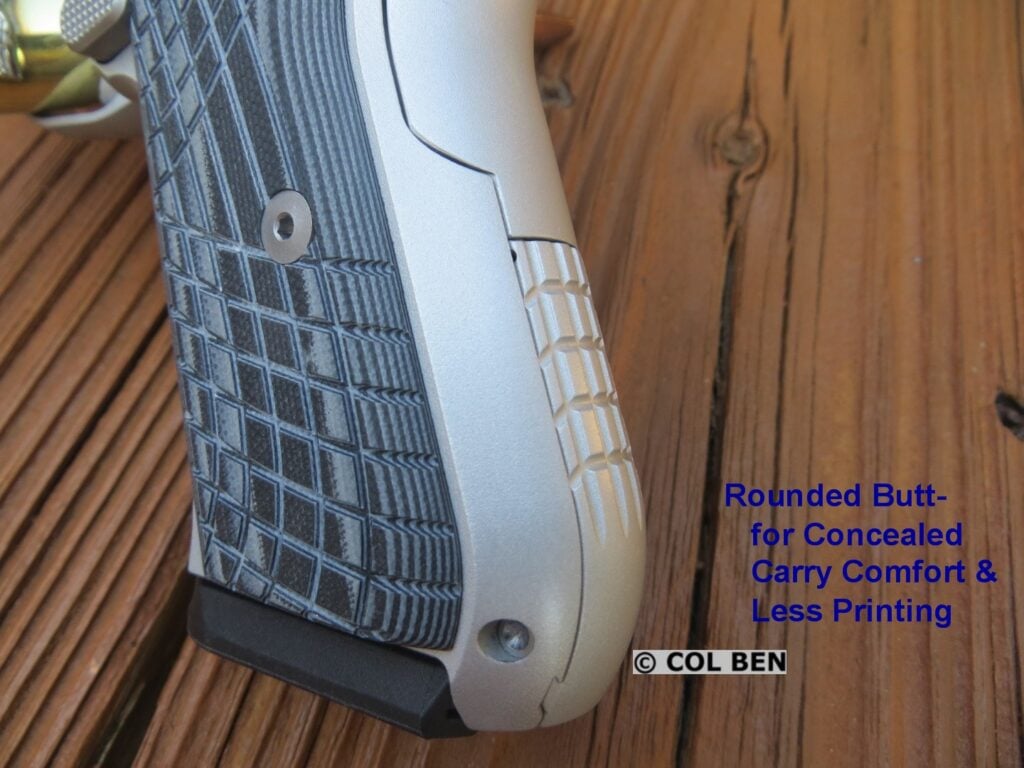

Ergonomics – Score: 9
Overall, the ergonomics of the KDS9c were very nice. Aside from the pistol’s outstanding appearance and excellent fit and finish, the thin G10 grips are durable, resistant to moisture, and have a high strength-to-weight ratio. The grip’s body was ample to allow me to acquire a decent and comfortable grip, and I could easily reach all the controls without changing my grip. The frame is undercut at the rear of the trigger guard, but for me, again, is not deep enough to allow for a real high grip on the gun for my medium-sized hands. The ergonomic design with the front and backstrap texturing is not aggressive enough for me, is shallow, and does not have enough traction to give an extra firm grasp of the pistol, but it was not really slippery in my hand and worked fine. In my opinion, especially as a shooter prone to much perspiration, they should be slightly more aggressive, and I like LPI checkering. I really like the rounded Bobtail Butt for concealed carry comfort and less printing.
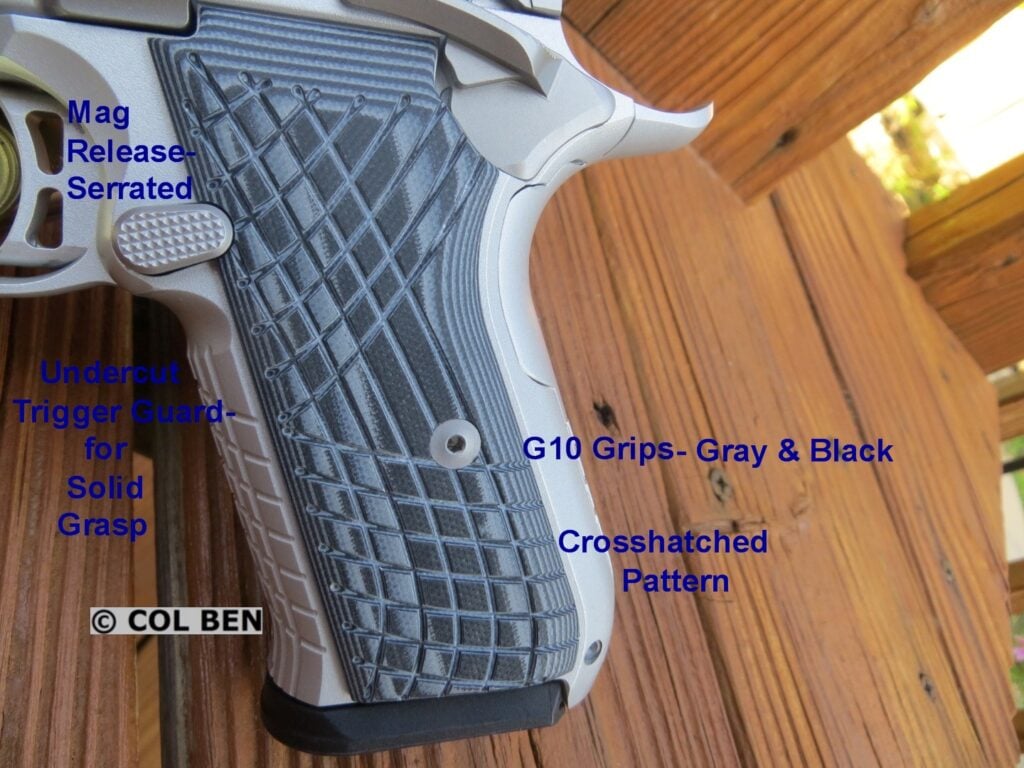

Miscellaneous – Score: 9
As always, before shooting any new gun, I disassembled, lubed, cleaned, and re-assembled the KDS9c pistol before I shot it. I did not have to press the trigger to disassemble it, and it was very easy and quick to do, like with a 1911 pistol, but without a barrel bushing. No bushing is necessary since the bull muzzle locks directly into the slide. The pistol does not include accessories like some others, e.g., a holster or mag pouch, but this is not even close to being a deal breaker. It’s just nice to have. There is a one-year warranty for the original purchaser rather than a lifetime warranty for all. The external extractor and ejection of shells was positive, brisk, and launched empties consistently away from where I shot the gun. The frame has a prominent and well-shaped beavertail grip and can function as a cocked-and-locked single action with a thumb safety, but no grip safety. I found that almost all of my IWB and OWB holsters for my 4.00″ and 4.25″ pistols will fit it, but of course, some are slightly longer. When the rear sight is removed, the shooter can remove the plate covering the optic mount to install an optional optic plate and a red dot. Optic mounting plates are available for the commonly used Shield RMSc and the Holosun-K patterns.
Total Points = 96 Out Of 100 Possible.
Recommend Or Not
I certainly recommend this outstanding all-around defensive handgun for serious consideration as your concealed carry compact gun. This single-action 1911-style pistol with its high-capacity 9mm magazine is superb. I especially like its accuracy, reliability, high visibility green fiber optic front sight matched with its black, serrated, adjustable rear sight, 15-round capacity, outstanding fit, finish, and appearance, nice weight for carry, and medium compact size for concealability. Its felt recoil was manageable for a compact 9mm, and its smooth and rounded lines prevent snags. Love the rounded Bobtail Butt to help concealed carry and for less printing. It has many features for its price. While I only shot about 300 rounds through it, I want to shoot it more to see its long-term reliability. Overall, I was very impressed with its accuracy out of the box, its low muzzle flip and moderate felt recoil for a compact 9mm, and its excellent reliability with no malfunctions or stoppages. This machined 1911-style pistol is made to a very high standard, with performance and reliability as its primary purpose. The price is nice for the many features you get.
These are just my opinions and ideas, so handle and shoot it for yourself. I hope this review of the Kimber KDS9c, single-action compact double-stack 9mm, has helped you gain some information you did not previously have. Consider that these are just my opinions with limited live-range shooting. Like always, I recommend that you shoot any handgun yourself before you purchase it. Decide on your criteria, how you will primarily use the gun, and what features are important to you and for which you are willing to pay ahead of your range time. Then critically evaluate the gun yourself per your criteria and purpose, with standard drills (several mentioned in my book), with various ammo types and brands, over an extended break-in period of about 500 rounds. Remember, Safety First Always.
Continued success!
Photos by Author and Kimber America.
Appreciation & Contacts:
Kimber America
1-888-243-4522
Troy, AL 36081
Santa Rosa Shooting Center
Pace, FL 32571
Jim’s Firearms
Pensacola, FL 32507
* This personal opinion article is meant for general information & educational purposes only, and the author strongly recommends that you seek counsel from an attorney for legal advice and your own personal certified weapons trainer for proper guidance about shooting & using YOUR firearms, self-defense, and concealed carry. It should not be relied upon as accurate for all shooters & the author assumes no responsibility for anyone’s use of the information and shall not be liable for any improper or incorrect use of the information or any damages or injuries incurred whatsoever.
© 2024 Col Benjamin Findley. All Rights Reserved. This article/review and its images/pictures may not be reprinted, reproduced, or distributed in whole or in part by mechanical means, photocopying, electronic reproduction, scanning, or any other means without prior written permission. For copyright information, contact Col. Ben Findley at [email protected].
Read the full article here

